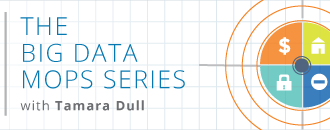Process-centric initiatives are often optimal approaches for the things that companies want to accomplish. Business processes make it possible to directly connect work to business outcomes that lend themselves to various metrics that provide clarity for business performance.
Process-centric initiatives are often optimal approaches for the things that companies want to accomplish. Business processes make it possible to directly connect work to business outcomes that lend themselves to various metrics that provide clarity for business performance. On the other hand, data and data-oriented solutions, by themselves, don’t usually map directly to business outcomes, and as such, usually can’t be measured by value contributed to desired outcomes and achievement of key corporate goals. But — business processes and data are inextricably bound together. Processes create, modify and consume data – one might even say processes live and breathe data. It is through business processes that data can be mapped to business value.
Companies generally have not taken a holistic view of business information, technologies to improve it, or its impacts across end-to-end processes or businesses, instead treating data as information islands within specific system silos.
Kalido, The State of Data Governance Maturity 2011
Notions like “Big Data” and “Information as an Asset” have stimulated thinking in many enterprises about extracting more value from the data already in enterprise repositories to benefit the business and its goals. But to extract that value from data, it’s not about the data nor is it about data governance. The key focus should be the business processes that impact revenue, business agility, competitiveness, and overall positive performance. However: both reliable data and effective data governance are key enablers of gaining value from business processes.
Data governance is an important strategy both to maintain data in its most usable condition and to ensure consistency in how processes work effectively across the enterprise, by sustaining the quality, accessibility and relevance of data used by processes. Instead of many silo’d processes working on silo’d data, data governance contributes greatly to connecting essential pieces to synch significant business processes to the bigger enterprise strategic picture.
Martin Atherton on data governance as an enabler of business value:
For many companies, it is common to focus on the minimum standards required to achieve compliance, instead of seeking to incrementally expand the effort and reap the benefits of being compliant more broadly across the business. In a previous research note, we used the phrase ‘value driven compliance’ to highlight the difference between approaching regulatory compliance as a chore versus seeing it as a business enabler.
Some of the difficulty of transitioning how enterprises derive value from business processes (and the data running through them) is the fact that most data-related initiatives have been driven by IT instead of by more business-oriented roles. To enable better business outcomes, data governance needs to bring business roles and IT teams together, as well as incorporating the support of various levels of management and strategic decision-makers. Too many times, data governance has not been implemented strategically. Instead it has been marooned by ad hoc decisions and “policies” tied more to daily operational situations. Without involving data governance in key corporate strategies, enterprises are not in good position to handle internal data issues, let alone address the ever-growing proliferation data from many new sources inside and outside the enterprise.
Ross Dawson expands on the notion of “governance as an enabler”:
Governance should focus as much on enabling innovation and taking useful risks as about managing and mitigating risk…What needs to happen is that governance, risk, and compliance become part of the process of creating business value…More generally, I think it is important to note that IT governance and corporate governance have long been treated as separate. As I pointed out in my keynote this morning, technology – including in data management – is increasingly central to corporate strategy.
With good commitment from management, business units and IT teams alike, data governance initiatives are a very good way to manage data more effectively for greatly improved use in business processes. Data governance should provide the means to coordinate efficient and non-redundant business processes, along with the necessary data assets, across the enterprise, between lines of business. From data governance coordination, standards for reliable data and optimized business processes can be implemented, maintained and changed as needed. Data governance is also an enabler of acquiring important insights into both data and business processes.
In my interactions with Forrester clients, I get the sense that data governance is receiving the most senior-management-level attention today than I’ve seen throughout my 18+ year data management career.
Tangible Value
Data alone carries no value. Unusable and poorly managed data carries no value. Real cost savings obviously result when data sources are streamlined and cleaned up, when processes are more responsive to business needs. Great value can result when business intelligence and other processes are based on the right data that can be trusted to lead to decisions that are more accurate and timely. The tangible benefits and value of data governance and data are further revealed through their connections to business processes and the desired outcomes from those processes that connect to corporate strategies and goals.
Originally published on Hub Designs Magazine September 2011
About the author: Julie Hunt is a software industry solution strategist and analyst, providing market and competitive insights. Her 25+ years as a software professional range from the very technical side to customer-centric work in solutions consulting, sales and marketing. Julie shares her takes on the software industry via her blog Highly Competitive and on Twitter: @juliebhunt For more information: Julie Hunt Consulting – Strategic Product & Market Intelligence Services







